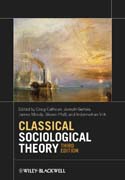
This comprehensive collection of classical sociological theory is a definitive guide to the roots of sociology from its undisciplined beginnings to its current influence on contemporary sociological debate. Explores influential works of Marx, Durkheim, Weber, Mead, Simmel, Freud, Du Bois, Adorno, Marcuse, Parsons, and Merton Editorial introductions lend historical and intellectual perspective to the substantial readings Includes a new section with new readings on the immediate 'pre-history' of sociological theory, including the Enlightenment and de Tocqueville Individual reading selections are updated throughout INDICE: VOLUME ONE: Classical Sociological Theory. Part I: Precursors to Sociological Theory. Introduction to Part I. 1. Thomas Hobbes. Of the Natural Condition. 2. Jean-Jacques Rousseau. Of the Social Contract. 3. Immanuel Kant. What is Enlightenment? 4. Adam Smith. 'The Wealth of Nations'. 5. Adam Smith. The Theory of Moral Sentiments. Part II: The Sociological Theory of Alexisde Tocqueville. A: Introduction to Part II. 6. The Ancient Regime and the French Revolution. B: Democracy in America. 7. Influence of Democracy on the Feelings of the Americans. 8. Tyranny of the Majority. 9. Influence of Democratic Ideas and Feelings on Society'. Part III: The Sociological Theory of Karl Marxand Friedrich Engels. Introduction to Part II. A: Alienation and Historical Materialism. 10. The German Ideology (Karl Marx and Friedrich Engels). 11. Economic and Philosophical Manuscripts of 1844 (Karl Marx). B: History and Class Struggle. 12. Manifesto of the Communist Party (Karl Marx and Friedrich Engels). 13. The Eighteenth Brumaire of Louis Bonaparte (Karl Marx). C: Capitalism and the Labor Process. 14. Wage-Labour and Capital (Karl Marx). 15. Classes (Karl Marx). Part IV: The Sociological Theory of Emile Durkheim. Introduction to Part III. A: Society and Social Facts. 16. The Rules of Sociological Method. B:Solidarity and Modern Life. 17. The Division of Labor in Society. C: Origins of Collective Conscience. 18. The Elementary Forms of Religious Life. D: Egoism and Anomie. 19. Suicide'. Part V: Sociological Theory of Max Weber. Introduction to Part IV. A: Method of Social Science. 20. 'Objectivity in Social Science. 21. Basic Sociological Terms. B: Religion and Rationality. 22. The Protestant Ethic and the Spirit of Capitalism. C: Bureaucracy and Power. 23. The Distribution of Power Within the Political Community: Class, Status, Party 24. TheTypes of Legitimate Domination 25. Bureaucracy. Part VI: Self and Society in Classical Social Theory. Introduction to Part V. A: George Herbert Mead. 26. The Self. B: Georg Simmel. 27. The Stranger. 28. Group Expansion and the Development of Individuality. 29. The Dyad and the Triad. C: Sigmund Freud. 30. Civilization and its Discontents. D: W. E. B. Du Bois. 31. The Souls of Black Folk. E: Thomas Definition of the Situation (or Regulation of the Wishes? Part VII: Critical Theory and the Sociology of Knowledge. Introduction to Part VI. A: Max Horkheimer. 33. Traditional and Critical Theory. B: Walter Benjamin. 34. The Work of Art in the Age of Mechanical Reproduction. C: Max Horkheimer andTheodore Adorno. 35. The Culture Industry. D: Herbert Marcuse. 36. One Dimensional Man. Part VIII: Structural-Functional Analysis. Introduction to Part VII. A: Talcott Parsons. 37. The Position of Sociological Theory. 38. An Outline of the Social System. B: Robert Merton.
- ISBN: 978-0-470-65567-2
- Editorial: John Wiley & Sons
- Encuadernacion: Rústica
- Páginas: 576
- Fecha Publicación: 11/08/2011
- Nº Volúmenes: 1
- Idioma: Inglés
